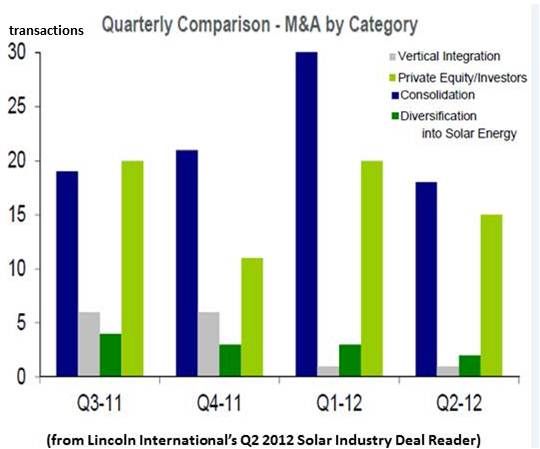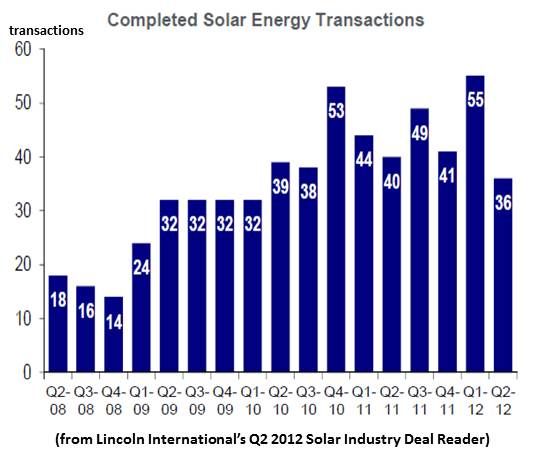Lincoln International’s Frankfurt office engineered the acquisition of German micromorph thin film manufacturer and solar developer Inventux Technologies AG by the Argentinian-Chilean Consortium Covema SACIS in August 2012. Chicago-based Chaim Lubin, a VP in Lincoln’s Renewables group, did preliminary work on the deal in early 2012.
“What Lincoln does, on a global basis, is advise companies on mergers and acquisitions,” Lubin explained. “We help companies buy or sell. Most of our activity is on the sell side. We advise companies, shareholders or private investors on running a global sale process.”
Covema, a construction consortium, will maintain the Inventux 35-plus-megawatt production capacity in Germany for its module supply and use its own solar engineering, procurement and construction (EPC) experience to develop solar projects in South America. “The South American market is expected to grow. Covema sees this as a play to have its own technology. Inventux was trying to grow its demand.”
Though the Inventux deal took longer, a typical acquisition is a six-month process, Lubin said. “But that is market-driven. When silicon PV was more expensive, thin film was a more attractive offering. Now that it has come down, the Inventux sale took longer.”
The price on the Inventux sale was undisclosed, as are most prices in acquisitions involving parties that are not public. “It is very rare that we are able to talk about valuation,” Lubin said. “Our clients value confidentiality.”

Referring to the current solar industry consolidation, which GTM Research has forecast could see 180 companies absorbed or bankrupt by 2015, Lubin said, “it is pure economics, especially in the panel space. There are too many companies. It is a consolidation that needs to happen.”
For years, he has told clients, “'If you are not going to be the consolidator -- the one who goes out and buys other companies -- you should consider an exit. Now we look like fortune-tellers.'”
“From the data in the market,” he said, “valuations have come down. Where we are seeing opportunity is on the development end.” The development capabilities of First Solar (Nasdaq:FSLR) and SunEdison, he agreed, are examples. “People recognize there is a real value in companies that are able to get a customer to want to buy solar and then take that project to completion. That is the model I am talking about. There are companies doing that, but they don’t think of themselves that way -- and they should.”
Lubin thinks valuations in solar may be “bottoming out” because private investors are once again showing interest. “For 2013,” he said, “the winner of the election is going to largely determine in the near term what the space is going to look like.” He would, he said, “leave it up to the public to decide, based on what each candidate has said.”
The key part of his job, Lubin said, “is the deal. The preparatory phase comes first. We spend a lot of time getting companies ready. But we’re not consultants. We’re not in the business of spending two years redeveloping a company to get it sold.”
Lubin and his team make recommendations and help organize a company. They do factory walkthroughs, even suggesting things like cleaning up tools or posting evaluative metrics.
“The larger piece of what we do,” he said, “is putting together the positioning, the story and the material we will use in the marketing.”
They also may do “a financial cleanup” and then “some type of book or presentation that articulates why the company we are selling is valuable.”

Next comes “a list of who we are going to approach,” Lubin said. “We base it on our industry knowledge, our connectivity within the industry investor universe, and the private equity universe.”
As an international bank, Lincoln takes a global approach to deals. “Solar is a great example,” Lubin said, “because few industries are as global as solar.” The Spanish solar market is really challenging right now, he said, “but there are solar companies in Spain that may like the opportunity in the U.S.” Lincoln facilitates that type of deal-making worldwide, he said. “My colleagues in Madrid are the same to me as my colleague in the next office.”
Each list of buyers is developed with the client. “Some clients want absolutely the highest price. Some are more interested in getting the right partner. And some want to get it done as fast as possible and don’t care about anything else.”
When everything is ready, Lubin said, “You go out into the market. And a lot happens. A lot of my time then is spent on the phone. There is a lot of conversation with all the different parties.” He is always, he said, “trying to connect dots. I am trying to connect the interests of one party to the interests of another party.”
Many companies don’t realize there are alternatives to an IPO, Lubin explained.
“Every company is different,” Lubin said. “I spend a lot of time talking about whether a sale makes sense. I can’t tell you how many times I’ve dealt with solar companies and said, ‘No, this is not the right time.’ It doesn’t do me any good to take a company out into the market if they’re not ready. Our success is based on getting things completed, not on just getting out there.”



